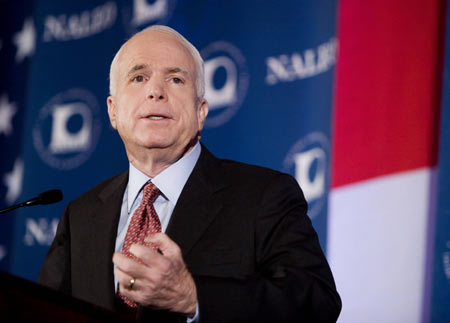Clarifying his economic credentials in a speech in Denver, McCain pledged to balance the federal budget, impose fiscal discipline on Washington and modernize how the government does business in order to save billions of dollars.

Republican presidential candidate U.S. Senator John McCain speaks to the National Association of Latino Elected and Appointed Officials (NALEO) 25th Annual conference and political convention in Washington, DC, June 28, 2008. (Xinhua/Reuters, File Photo)
He promised to veto "every single bill with wasteful spending."
Income taxes are a key difference between the two candidates.
The Democratic senator favors tax cuts for middle-class workers and tax increases for top earners.
McCain pledges to cut taxes for all and raise them on none. Government should shrink, not grow, he told his audience in Denver.
The candidates disagree in other areas connected to the economy, including trade and health care reform. Both propose spurring job growth through programs to increase U.S. use of solar, wind and other renewable energy sources.
In a recent poll on candidates' economic plans, 50 percent said their views more closely resembled McCain's goal of cutting taxes for the middle class and for businesses, simplifying the tax code, maintaining free trade and eliminating government waste.
Forty five percent said their views more closely resembled Obama's goal of cutting taxes for 95 percent of American families, eliminating special tax breaks for big corporations, renegotiating trade treaties, creating jobs by investing in research and education and in new energy sources.
(Xinhua News Agency via agencies July 8, 2008)